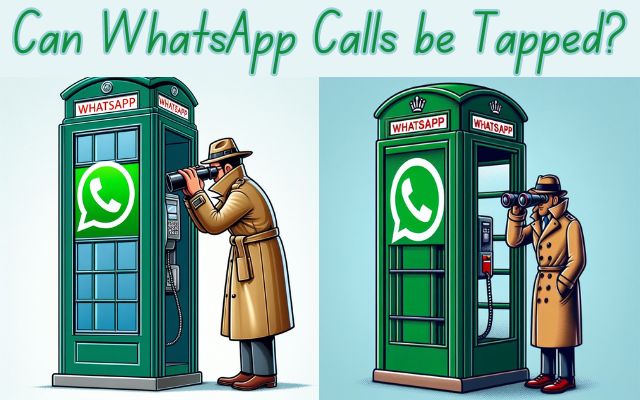Can WhatsApp Calls be Tapped? Unveiling the Truth
“Unveiling the Truth: The Security of WhatsApp Calls”

In today’s digital age, the question “Can WhatsApp calls be tapped?” has become a topic of significant interest and concern. As one of the most popular messaging apps globally, WhatsApp has over two billion users who rely on its services for text messaging, voice calls, and video calls. The app’s widespread use makes it a potential target for those seeking to infringe on personal privacy.
WhatsApp prides itself on its robust security features, including end-to-end encryption, which is designed to ensure that only you and the person you’re communicating with can read what is sent, and nobody in between, not even WhatsApp. This encryption applies to messages, phone calls, photos, and videos. But does this mean that WhatsApp calls are completely immune to tapping?
The answer to this question is complex and multifaceted, involving an understanding of various technological and legal aspects. This article aims to delve into these aspects, providing a comprehensive overview of whether and how WhatsApp calls might be susceptible to tapping.
Now, we will explore WhatsApp’s security features, discuss the possibility of call tapping, and provide tips on how to protect your calls. So, let’s embark on this journey to unveil the truth about the security of WhatsApp calls.
Understanding WhatsApp’s Security Features
WhatsApp, a globally recognized messaging app, prioritizes the security of its users by implementing several key features. One crucial aspect is end-to-end encryption, ensuring that only the sender and receiver can access messages and calls, with WhatsApp unable to access this data.
This encryption applies comprehensively across the platform, covering text messages, voice calls, video calls, and media sharing. In addition to end-to-end encryption, WhatsApp has recently introduced three new security features: Account Protect, Device Verification, and Automatic Security Codes.
Account Protect serves to verify user identity during the transition of WhatsApp accounts to a new device, alerting users to any unauthorized attempts to move their account.
Device Verification is designed to safeguard users from potential mobile device malware that might compromise their device and misuse their WhatsApp account to send unwanted messages.
Automatic Security Codes, rooted in a process called “Key Transparency,” enables users to automatically verify the establishment of a secure connection.
These security measures, combined with end-to-end encryption and regular updates, underscore WhatsApp’s commitment to ensuring the security of its users.
The Possibility of Tapping WhatsApp Calls
The question “Can WhatsApp calls be tapped?” has been a topic of significant interest and concern. WhatsApp’s end-to-end encryption ensures that only the sender and recipient can access the call data, providing a secure communication channel. However, instances have raised questions about the efficacy of this security feature.
WhatsApp’s end-to-end encryption is designed to secure calls and messages between the sender and the receiver. In the event of interception, the communication appears as unintelligible gibberish. However, if a device is compromised by malware, hackers may potentially access decrypted calls on the compromised device.
Instances where WhatsApp’s security has been questioned include investigations into the death of Bollywood actor Sushant Singh Rajput in India. Agencies selectively leaked WhatsApp conversations to the media, sparking concerns about WhatsApp’s ability to protect privacy and prevent unauthorized access and misuse.
In another case, a Reddit user expressed suspicion that their WhatsApp calls may have been tapped. The user reported that a personal acquaintance discussed the exact same topic they were conversing about with a friend on WhatsApp.
These examples emphasize the challenges in ensuring the security of digital communications. While WhatsApp’s end-to-end encryption provides a robust defense, it is not entirely foolproof.
Case Studies and Examples
While the security features of WhatsApp are robust, there have been instances where the security of WhatsApp calls has been questioned.
One such instance occurred in India, where agencies investigating the death of Bollywood actor Sushant Singh Rajput began to selectively leak WhatsApp conversations to the media. This raised serious concerns about WhatsApp’s ability to protect a person’s privacy.
In another instance, a Reddit user expressed firm suspicion that their WhatsApp calls may have been tapped. The user reported that a personal acquaintance spoke about the exact same topic that they were discussing with a friend on WhatsApp.
These instances highlight the complexities involved in ensuring the security of digital communications. While WhatsApp’s end-to-end encryption provides a robust line of defense, it’s not completely foolproof.
How to Protect Your WhatsApp Calls
In the digital age, safeguarding your privacy is crucial. Here are some strategies to secure your WhatsApp calls:
- Protect Your IP Address: WhatsApp offers a feature to shield your IP address during calls. This feature functions by routing your calls through WhatsApp’s servers, preventing direct connections and avoiding the disclosure of your IP address to the person you’re calling. To activate this setting, navigate to Settings > Privacy > Advanced > Protect IP address in calls.
- Block and Report Suspicious Numbers: For calls or messages from suspicious numbers, promptly block and report them. To do this, open the relevant chat, tap the three-dot icon at the top, select ‘More’ from the menu, and tap the ‘Block’ button.
- Silence Unknown Callers: Minimize distractions from unfamiliar calls by enabling the ‘Silence Unknown Callers’ setting. Find this option under Settings > Privacy > Calls.
- Control Who Can Add You to Groups: Mitigate the risk of being added to questionable groups by adjusting your group settings to ‘My Contacts.’ Locate this setting under Settings > Privacy > Groups.
- Exercise Caution with International Calls: Be cautious when receiving WhatsApp calls or messages from unfamiliar international numbers. If you haven’t interacted with anyone from the corresponding country, it’s advisable not to answer.
Remember, while these strategies enhance your WhatsApp security, they aren’t foolproof. Stay vigilant and promptly report any suspicious activity to WhatsApp.
FAQ
Can someone listen to your WhatsApp calls?
WhatsApp uses end-to-end encryption, which means only the sender and recipient can access the call data. However, if your device is compromised by malware, hackers might potentially gain access to your calls.
Can WhatsApp calls be monitored?
WhatsApp calls are encrypted end-to-end, meaning that the communication is secured between only the sender and the recipient. This encryption ensures that anyone who tries to intercept the conversations will not be able to decipher the messages or hear the audio properly.
How secure is WhatsApp call?
WhatsApp calls are secured with end-to-end encryption, ensuring that nobody can hear or read them.
Can WhatsApp call be traced by police?
WhatsApp does not store messages in a central location, making it impossible for police, investigators, the government, or even WhatsApp itself to monitor communications. However, WhatsApp can trace the origin of a message using its source and destination codes.
Can WhatsApp calls be tapped in India?
WhatsApp calls are protected by end-to-end encryption, so they cannot be tapped. However, if a device is compromised, hackers might potentially gain access to calls.
Can CBI track WhatsApp?
WhatsApp discloses account records solely in accordance with its terms of service and applicable law. A Mutual Legal Assistance Treaty request or letter rogatory may be required to compel the disclosure of the contents of an account.
Is WhatsApp really private?
WhatsApp uses end-to-end encryption for all its services, which means that only the sender and recipient can view the messages. However, while the app safely encrypts conversations, it doesn’t protect them from people taking and sharing screenshots of conversations and personal information.
How will I know if someone is reading my WhatsApp messages from another device?
You can check your WhatsApp Web sessions to see if your WhatsApp is being accessed from another device. If you find more than one device accessing your WhatsApp, know there’s something fundamentally wrong.
Conclusion: The Security of WhatsApp Calls
The question “Can WhatsApp calls be tapped?” is complex and multifaceted. While WhatsApp’s end-to-end encryption and other security features provide a robust line of defense, they are not completely foolproof.
Instances of suspected call tapping and leaks of WhatsApp conversations have raised concerns about the app’s ability to protect user privacy. However, it’s important to note that these instances are exceptions rather than the norm.
WhatsApp continues to enhance its security features to protect user data. Users can also take steps to safeguard their calls, such as protecting their IP address, blocking and reporting suspicious numbers, silencing unknown callers, controlling who can add them to groups, and being cautious with international calls.
In the digital age, ensuring the security of our communications is paramount. As users, we must stay informed about the latest security features and best practices to protect our privacy.
Remember, no security measure is completely foolproof. Always stay vigilant and report any suspicious activity to WhatsApp. Let’s continue to unveil the truth about the security of WhatsApp calls and strive for a safer digital world.






